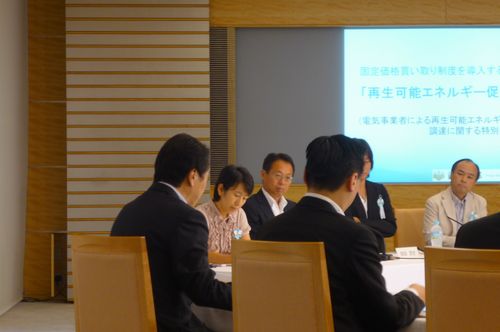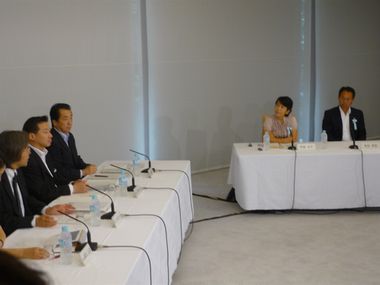July 12, 2011
An Interactive Webcast with Japan's Prime Minister on Renewable Energy Policy: A First for Japan
Keywords: Newsletter
JFS Newsletter No.106 (June 2011)

Copyright e's Inc.
On the afternoon of Sunday, June 12, 2011, Prime Minister Naoto Kan met in his office with prominent experts for a discussion on the future of Japan's national renewable energy policy -- with tens of thousands joining online.
The session was organized in response to public requests that the prime minister (PM) promote clean energy, and included participants Takeshi Okada, former coach of Japan's national football team; world-renowned musician Ryuichi Sakamoto; Masayoshi Son, CEO of Softbank Mobile Corp.; Takeshi Kobayashi, representative director of ap bank Co.; and Junko Edahiro, chief executive of Japan for Sustainability (JFS). On the government side, along with the PM were deputy chief Cabinet secretary Tetsuro Fukuyama and Hiroshi Tasaka, special advisor to the Cabinet.
The event lasted over two hours, which was thirty minutes more than originally planned. During the session the invited experts offered candid advice to the PM and exchanged views on how renewable energy should be promoted in Japan in the future. What made this session remarkable was that it was completely open to the public as a live webcast over the Internet, with the audience invited to send in comments and questions via Twitter. This allowed thousands of citizens and the media to participate in the session in real time. This format was unprecedented in Japan, the first time in this country to use this type of dialogue between the public, the government, and the media, and many felt it was an initiative moving closer toward true democracy.
At the start of the session, the PM opened by saying, "Japan sets out its Basic Energy Plan every three years. Before the nuclear accident occurred, it was planned that the ratio of nuclear power in Japan's energy portfolio by 2030 would be 53 percent and renewable energy sources would be 20 percent. Afterwards, however, I announced a review to reevaluate the plan from scratch, and at the recent G8 summit in France I announced my decision to rewrite it so that the ratio of renewable energy sources would be 20 percent at the earliest in the 2020s instead of by 2030. I have a strong commitment to accomplish this in my lifetime, not only because I believe I should do this as Prime Minister but also because I am interested in this issue personally."
After the PM's speech, the five experts each made a five-minute presentation and gave their advice, focusing mainly on the promotion of renewable energy. The Prime Minister then responded. Here are selected excerpts of his comments:
"From my long experience serving as a politician, I would like to comment to you about the past and the future. In Japan, although we have had plans in place like promoting wind energy, for example, the administration has maintained a certain set policy that 'Nuclear power should be promoted, and to promote it we will eliminate any obstacles that we can.' I have felt this for the last 30 years. Recently, I have proposed policy instruments like the Feed-in Tariff scheme to guarantee the purchase of electricity generated from renewable energy sources, which has not been introduced yet. There are loads of reasons and logical arguments, saying that 'It is not possible,' so nothing has been done. How can we overcome this situation? It's true that I should do it as the Prime Minister. But there is a formidable barrier, unfortunately. Even so, I know that now is the time that we can change it. If we can't change it now, it won't change for another ten years, so I proposed a bill to promote renewable energy on March 11 to the Diet, and I have told the Minister of Economy, Trade and Industry and other persons in charge to work on getting the bill passed as soon as possible, but their actions have been slow."
"Renewable energy is generated on a small-scale basis in many places. For example, we could have many sites generating five to 1,000 kilowatts of electricity, rather than a big company building three power plants with 1,000 megawatts of generating capacity. Renewables are truly a participatory kind of energy. Let's open energy production up to the public. Let's give people the right to participate in energy creating schemes, just like voting rights. But it may be difficult for the public to find a market to sell the energy they generate, so of course power distributors need to buy the generated power at a fixed rate and distribute it to the transmission network.
"Another point is that the term 'energy conservation' sounds a little passive. The current government's plan places an emphasis on supplying electricity. Rather we should reduce the supply, develop the technology, and create a sustainable society with less energy. The words 'stable supply of power,' often spoken by governments and businesses, really mean 'If power supply is reduced, we will be in danger.' It's an expression to keep things as they are. To change this perception, I would like everyone to demand power generating and selling rights, just like voting rights. When the people's demands are loud enough, the trend will not be able to be turned back to the past, even if the political landscape changes."
In her remarks, Edahiro commented, "Many citizens want to promote renewable energy, and so do the national leaders, but things don't seem to change. How do we better articulate our vision and make our voices heard by politicians and bureaucrats?" To which Kan replied, "Politicians and bureaucrats take actions mostly at the request of their acquaintances. If you don't know them in person, you should try to get to know them, whether they are members of the Diet or city assemblies, just like the lobbyists do in the United States. The bureaucracy will change drastically according to strong public opinion."
Edahiro added, "One of the good points about renewable energy is that it will be realized by the convergence of all ministerial efforts, including the Ministry of the Environment, and Ministry of the Economy, Trade and Industry, and others. To promote 'de-fossil' fuel (to reduce dependence on fossil fuels), Denmark formed an all-ministerial committee headed by the prime minister. This could be done in Japan too. Please promote the system to make full use of each ministry's strengths." Kan strongly replied, "We already have a system to promote nuclear power, and we can use it to promote renewable energy, too. To promote nuclear power, Japan even created the Science and Technology Agency, and set up many organizations, including the Institute for Nuclear Studies. If we create a corresponding level of organization, like a Renewable Energy Promotion Agency, we can even attain the goal earlier than 10 years. The government will work quickly to discuss such a system across all agencies and ministries."

Copyright e's Inc.
The number of real-time viewers of the webcast peaked at 70,000, with many sending in comments and questions via Twitter. The PM replied earnestly to their questions. To a question concerning the power- generating business, he said, "This is a good chance to start discussions on reforms of the electrical power industry. We will create a framework for discussion as early as possible, and I'd like all citizens to discuss the matter. I hope it will lead to reforms of the system." To a question concerning what would happen after he retires from the administration, Kan replied, "There are many ardent supporters of renewable energy in every political party. The power balance between the supporters of renewable energy and others will change as a result of an election, and I believe the policy will be maintained by the next administration. It's all citizens using their voting power that would ensure the policy succeeds."
In answer to the question, "Can the government organize this sort of event again to exchange opinions with the public?" he said, "Let's do it!" which was followed by applause.
As a closing remark, the Prime Minister said, "I had a great time listening to various stories today. For instance, Mr. Okada offered the quote about the Earth being borrowed from our children. It was indeed a miracle for the Creator to make the Earth. We now live in a miraculous environment. It would be ungrateful to the Creator if we were to make this planet uninhabitable, for example, with carbon dioxide emissions and nuclear contamination. While I am interested in scientific technology and believe in its possibilities, I have always wondered if human beings can truly control their technology. The government and the citizens must maintain control of it. Atomic and hydrogen bombs are symbols of technologies that emerged from curiosity and got out of control. The topic we are discussing now seems to be fundamental and yet very exciting. We may talk about different topics later on, but I hope those who are watching this live Internet broadcast can participate somehow."
* The streaming of the conference is still available on the Japanese government's Internet television channel.
http://nettv.gov-online.go.jp/prg/prg4972.html (Japanese only)
The number of viewers in the three days after the conference reached about 120,000. People are still engaged in an ongoing open discussion via Twitter, Facebook, and blogs.
In their comments, many people were positive. One said, "Was a politician ever so humble? Mr. Kan talked about renewable energy with eyes twinkling like a hopeful youth. I want to support him." Many said that their image of politicians and politics had changed by getting to know the human aspect of the politician, Prime Minister Kan. Also, many applauded the open approach of live broadcasting of the entire event and the use of Twitter.
Here is a sample of some of the other public comments: - I felt the embryonic movements of big change in Japan's democracy. - It was interesting! It was a step towards a Japan with the government and the people working together. Wonderful approach. I think this will be a breakthrough toward the realization of direct democracy in which these voices are reflected in politics. - It is good for the Prime Minister to come out for discussion in a way citizens can see him. I hope to see more and more discussion on different topics. - Leading experts in different fields and politicians of this country had a very frank and down-to-earth dialogue. It felt like a very open discussion with citizens, which was totally different from political debate in the past. It really made me happy to feel the coming of a new era. Please keep it up! - As far as I see this conference, I think we can see change in politics. I feel there is not much hope when I see politics in the mainstream media. - I hope this Internet conference format will continued. This is promising.
The Cabinet Office also hopes to create more opportunities for open dialogue with citizens based on the success of this conference. Junko Edahiro and the other participants are now discussing the next step to develop "an energy policy of the people, by the people, for the people" through a round-table meeting with the leaders of the Japanese government.
JFS hopes that this effort by national leaders and citizens using social media, the first of its kind in Japan and still relatively unique in the world, will move both renewable energy policy and Japanese democracy a step forward.
Written by Junko Edahiro
Related
"JFS Newsletter"
- 'Good Companies in Japan' (Article No.4): 'Eightfold Satisfaction' Management for Everyone's Happiness
- "Nai-Mono-Wa-Nai": Ama Town's Concept of Sufficiency and Message to the World
- 'Yumekaze' Wind Turbine Project Connects Metro Consumers and Regional Producers: Seikatsu Club Consumers' Co-operative
- Shaping Japan's Energy toward 2050 Participating in the Round Table for Studying Energy Situations
- 'Good Companies in Japan' (Article No.3): Seeking Ways to Develop Societal Contribution along with Core Businesses


